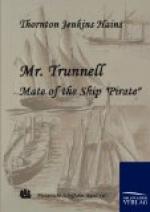When Trunnell came on deck again in the evening, his beard was a sight to be remembered. It looked as though a rat had nibbled it in spots. His hair was equally well done by the artist, but Jackwell’s last order had been obeyed. The men were mustered aft, and Trunnell announced that he was the man they wanted to stand from under. They remained silent until Johnson suggested that three cheers be given for the new skipper. Then all hands bawled themselves hoarse. That was all. I was now the first mate and took my meals at the cabin table, where Jennie and her mother had been wondering at Trunnell’s dexterity with his knife. The little mate appeared to realize that a certain amount of dignity and dress were necessary for the maintenance of correct discipline aboard, and he accordingly changed his shirt once a week and wore a new coat of blue pilot cloth. He sat at the head of the table, and went through his knife-juggling each meal, to the never ending amusement of Jennie, and admiration of Gunning, who swore that, “dey ain’t no man afloat cud do dat no better.” He, however, came through the rest of the cruise without even cutting his lip.
My duties and rating being those of a first mate, I had no longer the pleasure of being intimate with Chips and the rest forward. The carpenter, steward, and “doctor” had the quartermaster, Tom, from Trunnell’s watch for a second mate and companion at the second table. Tom was a Yankee and a good companion, so the change was satisfactory all around. I sometimes looked in at the carpenter’s room in the forward house, where he and a few chosen spirits would be holding forth upon some nautical subject, but I had to cut my visits short, for they worried Trunnell. Being suddenly raised did not quite inspire the necessary respect in his eyes, unless the person promoted showed unmistakable dignity and authority by dressing down all who came in contact with him. For some time it was pretty hard to speak to our little skipper. He disliked anything he imagined might tend to lessen the discipline aboard and had a horror of a mate or captain being familiar with the men.
My room was still in the forward cabin, but I now spent much time in the saloon, and helped Trunnell to shift his belongings aft to Jackwell’s cabin. The truculent knave had left little behind him save a lot of old clothes, bonds which were not negotiable, and some wrappers used by the bank of Melbourne for doing up packets of bills. Upon one of these was a mark of fifty pounds sterling, showing that Jackwell’s assets, unless enormous, could be made to fit in a very small space. He probably carried all he owned upon his person.
We went through everything in the cabin carefully, but the only thing of interest discovered was the photograph of a plump young woman torn fairly in two, the lower half bearing the inscription in Jackwell’s handwriting, “Good riddance to bad rubbish.”
I had found this in the chart case and had examined it some minutes without comment, when Miss Sackett took it from me. She gazed at it a moment, and cried out, “Why! it’s the third mate.”




